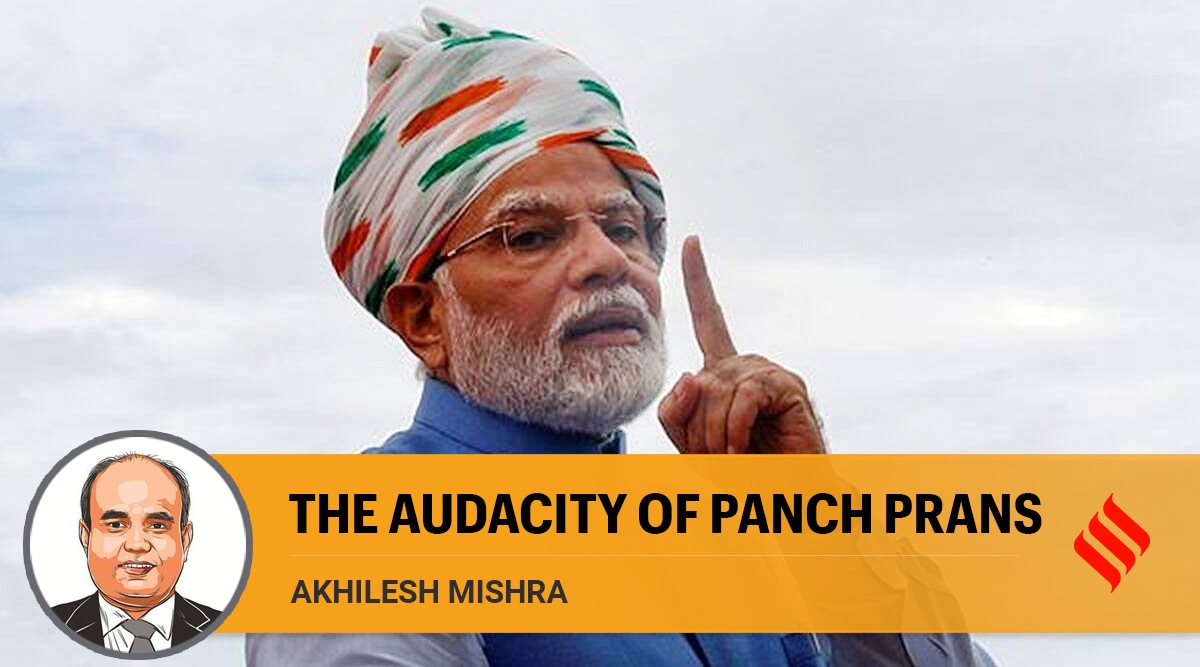 Prime Minister Narendra Modi addresses the nation from 17th-century Mughal-era Red Fort on Independence Day in New Delhi, India, Monday, Aug.15, 2022. (AP Photo)
Prime Minister Narendra Modi addresses the nation from 17th-century Mughal-era Red Fort on Independence Day in New Delhi, India, Monday, Aug.15, 2022. (AP Photo)True leadership is about transcending the immediate to plan for the future. The ability to diagnose society’s shortcomings that aren’t always apparent, identify solutions and inspire people is what sets apart ordinary politicians from epoch-defining leaders,
The panch pran speech by Prime Minister Narendra Modi, delivered on the 75thanniversary of Independence, will go down in history as among his finest ever and also among the finest ever Independence Day speeches. It is qualitatively different from Jawaharlal Nehru’s “Tryst With Destiny” speech. It is the context that makes Modi’s speech far more significant and transformative. How so?
In his eight years in office, and before that as chief minister for 13 years, Modi has set the benchmark for delivering on all five strands that he outlined as the mantra for India for the next 25 years. Therefore, what Modi did with his speech is to distil his life’s work into the five mantras and then start the process of institutionalising these into national traits.
The first pran is about inculcating a culture of thinking big and at scale. The digital payments success story best illustrates this. In 2016, UPI was launched, followed by BHIM. In a few years, India had the largest number of digital payment transactions in the world. There are countless other examples — the world’s largest financial inclusion programme, the largest vaccination drive, the largest health insurance programme and the largest social security schemes. So, when Modi exhorts us to aim for developed-country status by 2047, he comes with a track record of having delivered on multiple such seemingly improbable goals.
Subscriber Only Stories


The second pran is about societal change —decolonising our minds. Modi implores us to follow his example of not seeking external validation to measure our success but chart our own path. Why should the West decide the governance norms that others must blindly follow? Think of the Net Neutrality debate. India took the lead and the debate was over. Or think the recent debate on the presumed morality of India securing its energy needs. A certificate from the West did not matter to us —as it should not have —for the certifying countries were procuring their energy from the country they sought to ostracise. It is this confidence that needs to become part of the national character.
The third pran of pride, our civilisational heritage, is a no-brainer. Yet, it became the norm only after the advent of Modi. We have the world’s oldest civilisational sites, the most vibrant cultural and social festivities, the most diverse tourism sites and the oldest texts in literature and science. Why must we not proudly showcase them?
The fourth pran, unity and togetherness, is vital to pool in the strength of the nation towards one common goal. Modi’s personal example gives us a good template to understand the value of this resolution. As a CM, Modi never let parochial interests come in conflict with national interests.
The fifth pran about citizen duties is the razor’s edge that differentiates ordinary nations from those that emerge as leaders of their era. Governments alone can rarely affect mass change unless people play a proactive role. The corruption-free government that Modi has given can become part of the national character if citizens stop patronising corrupt politicians.
The panch prans, if taken to their logical conclusions, will serve India long after Modi has left the scene. They will become part of the national character. Governments will come and go but we will never revert to the era of self-loathing with small ambitions. The leadership that will emerge will match up to the expectations of an aspirational society. That is the audacity of Modi’s speech.
The writer is CEO, Bluekraft Digital Foundation and was earlier director (content) MyGov